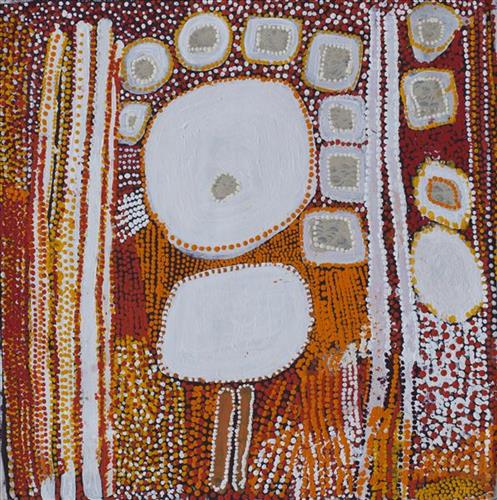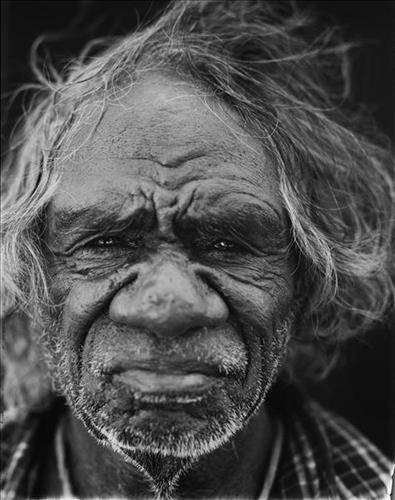Biography:
"I was born at Kulyakartu. Desert, middle of the desert. No hospital, no medicine, no anything. Everybody here [was] like that. We used to camp at this spring here, our sacred waterhole, Yilyara. This water sustained us. A long time ago when we were kids we would walk and they [the elders] would piggy back us to the next waterhole.
[Later] My elders sent me on an expedition to search for people. I walked a long way but found nothing. I was searching for people. All gone, nothing left. We used to see the fires the pujiman (traditional, desert dwellers) had lit, left as messages. People would light a fire and leave it burning so other Martu could see it [and say] "Martu are burning there." We would meet up with them then. But there were really no people left in the desert. All gone. We trekked forever, looking for Martu. I looked around but found no one. All of the pujiman families were gone. There were no people left in the desert. They had gone everywhere else.
Some of my family settled at Jigalong. They were in Jigalong and I was overjoyed to be reunited with my family. I was so happy to be living amongst them again. It was great. The families would look after us. But after working there for a long time I grew homesick for my Country. This area here [around Punmu Aboriginal community] is our Country. It's our Country right here. We returned to our Country with a Toyota and a grader that made the road. A grader right up to here. Punmu is a good place. It's a happy place to live. My spirit feels good living here. In pujiman time we lived in this area now. I'm happy with this life now, happy because I feel grounded by my Country. It's important to hold on to the legacy of the ancestors. It's up to the young people to carry it on now. For the ancestors past and present."
- Minyawe Miller as translated by Kanyirninpa Jukurrpa
Minyawe is a Warnman man born at Yilyara, a yinta (permanent spring) located on the border of Punmu Aboriginal community and immediately east of Nyayartakujarra (Lake Dora). Minyawe grew up in the Kulyakartu and Karlamily (Rudall River) regions with his sister Kanu (Karnu) Nancy Taylor (dec.) and their extended family.
As a young man, Minyawe lived a pujiman lifestyle and walked long distances carrying only his jangi (smouldering stick) and his jurna (hunting stick). By the 1960’s the last of the Western Desert pujimanpa (desert dwellers) had relocated to Jigalong, Marble Bar, Nullagine and Port Hedland; “When all people gone, everybody, I’m come last one. Looking around, looking for people. Nobody, nobody there… My family all gone to Jigalong, Marble Bar, Nullagine, all stations. They been working the station, working sheep, bullock; march them to Meekatharra, put them in the truck. I gotta go to family, gotta find them” (Minyawe Miller). Minyawe and his family collectively came to the decision to walk in from the desert, and after travelling hundreds of kilometres on foot they were finally collected by a truck that drove them to Jigalong Mission.
At Jigalong Minyawe met his wife Nyanjilpayi (Ngarnjapayi) Nancy Chapman, and from there the couple lived and worked together on several cattle stations throughout the Pilbara. Minyawe was an excellent horse rider and breaker. Later, at newly Aboriginal owned Strelley station Minyawe worked building roads and running the station. He relocated with his family to Punmu Aboriginal community as a foundational community member during the ‘Return to Country’ movement of the 1980’s, and lived there for many years before moving between Newman and Port Hedland in more recent times.
Minyawe paints great stretches of his Country in a very distinctive, precise style, creating beautiful undulations of linear forms using a limited range of mark making and colour. Minyawe’s work was selected for the Western Australian Indigenous Art Award in 2013, and has been exhibited since the inception of MMA in 2006 in galleries throughout Australia, in Singapore and the USA.




